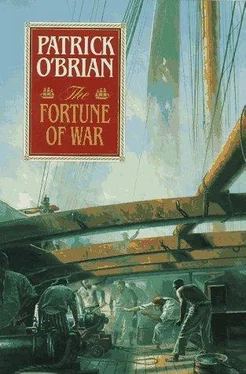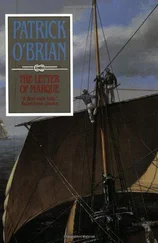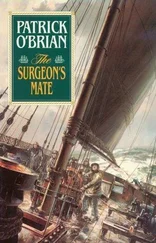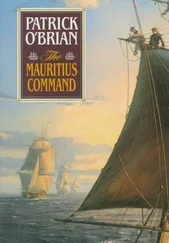Patrick O'Brian - The fortune of war
Здесь есть возможность читать онлайн «Patrick O'Brian - The fortune of war» весь текст электронной книги совершенно бесплатно (целиком полную версию без сокращений). В некоторых случаях можно слушать аудио, скачать через торрент в формате fb2 и присутствует краткое содержание. Жанр: Книги. Описание произведения, (предисловие) а так же отзывы посетителей доступны на портале библиотеки ЛибКат.
- Название:The fortune of war
- Автор:
- Жанр:
- Год:неизвестен
- ISBN:нет данных
- Рейтинг книги:3 / 5. Голосов: 1
-
Избранное:Добавить в избранное
- Отзывы:
-
Ваша оценка:
- 60
- 1
- 2
- 3
- 4
- 5
The fortune of war: краткое содержание, описание и аннотация
Предлагаем к чтению аннотацию, описание, краткое содержание или предисловие (зависит от того, что написал сам автор книги «The fortune of war»). Если вы не нашли необходимую информацию о книге — напишите в комментариях, мы постараемся отыскать её.
The fortune of war — читать онлайн бесплатно полную книгу (весь текст) целиком
Ниже представлен текст книги, разбитый по страницам. Система сохранения места последней прочитанной страницы, позволяет с удобством читать онлайн бесплатно книгу «The fortune of war», без необходимости каждый раз заново искать на чём Вы остановились. Поставьте закладку, и сможете в любой момент перейти на страницу, на которой закончили чтение.
Интервал:
Закладка:
'When I learnt that there was a possibility of meeting you,' said Johnson, bringing a portfolio from beside his desk. 'I put these in my baggage.' They were extraordinarily exact and delicate paintings of American birds, among them the anhinga. 'And here is the very fowl you were speaking of,' said Johnson, when they reached it. 'Do let me beg you to accept it, as some slight acknowledgment of the pleasure your monography gave me.'
Polite but steady refusal: Johnson urged the picture's trifling commercial value - he would be ashamed to say how little he gave the artist - but he was too well-bred to insist beyond a certain point and they moved on to the painter himself. 'A young Frenchman I met on the Ohio river, a Creole, very talented, very difficult. I should have ordered a great many more, but unhappily we fell out. He was a bastard, and bastards, as no doubt you have observed, are often more touchy than ordinary beings; one sometimes offends them without meaning to; and sometimes indeed they seem to trail their coats.'
Stephen was himself a bastard, and at the word his hackles rose; yet he could not but admit the justice of the remark, and what was much more to the point, a man as polite as Johnson would never have made it if he had known that it could have any present application. Clearly, Diana had been discreet: uncommonly discreet, since a friend's bastardy, divorce, or deformity was so often the earliest point of description, the earliest sacrifice to the candour of intimacy.
A servant came in and spoke to Johnson in a low tone. 'You will excuse me for two minutes, Dr Maturin?' he said. 'Just for two minutes, while I get rid of these people?'
'By all means,' said Stephen, 'and in the meantime I believe that I shall pay my respect to Mrs Villiers; for I understand that she is in the same hotel.'
'Oh yes, yes. Do - she will be delighted. Hers is the red door at the end,' said Johnson on the threshold. 'Straight down the corridor. You will find your way? I stand on no ceremony with you, as you see, my dear sir: and I will join you as soon as I have sent these men away.'
Along the passage: the last steps quite slow, and a pause before the red door. He tapped, heard a voice, and walked in. He had unconsciously composed his face so that it bore a civil unassuming old-acquaintance look, and he was surprised to find the effort that had been required when the expression fell apart on his seeing not Diana but a black woman weighing twenty stone.
'Mrs Villiers, if you please?' he said.
'What name shall I say, sir?' asked the black woman, smiling at him from her splendid height and bulk.
'Stephen!' cried Diana, running in.' 'Oh, how glad I am to see you at last.' The same step, the same voice; and he felt the same blow about his heart. He kissed her warm dry hand and felt its responding pressure. She was telling the black woman to hurry down and bring up the best pot of coffee that Madame Franchon could make. 'And some cream, Polly.' The veil of tears cleared from his eyes; he recovered his composure and said, 'What a magnificent creature.'
'Yes, yes,' said Diana in a kind of quick parenthesis, holding his hands and looking him full in the face, 'Johnson has dozens like that - he breeds the house-slaves for size. Stephen, you have come at last! I was so afraid you might not - I waited in all the morning - had everyone denied.' She drew him nearer and kissed him. 'You did not get my note? Stephen, sit down: you are looking quite pale. How are you, and how is poor Aubrey? The coffee will be here directly.'
'No note, Villiers. Was it discreet?'
'Oh, just compliments and begged you would call.'
'Listen, my dear, Johnson will be here in a minute. What does he know about us?'
At another time this question would probably have received a very fierce and disconcerting answer, but now she only said, 'Nothing: old acquaintance, practically childhood friends. Oh, Stephen, how glad I am to see you, and to see a British uniform, and to hear a British voice. I was so sorry, so very sorry about Clarges Street and all that wild dashing out of town - out of England - without even seeing you.' The coffee came, with cream and petits fours, and as she poured it out so she poured out her words, pell-mell - the Leopard's voyage, the wreck on Desolation Island, news of it all from Louisa Wogan; this dreadful, dreadful war, her mad decision to go back to the States; the loss of Guerri�, Macedonian, Java - how was Jack Aubrey bearing it? With Polly's return she had switched into French, and with astonishment Stephen observed that she was calling him tu. He was astonished too by her loquacity. Both she and her cousin Sophie had always talked at a great pace, but now Diana's words tumbled over one another; few sentences reached their end; and the connecting association of ideas was at times so tenuous that although he knew her very well he could scarcely follow. It was as though she had recently taken some stimulant which so hastened her mental processes that they outran even her outstanding powers of articulation.
He had known her in a great variety of moods - friendly, confidential, perhaps even loving for one short period; certainly, and for much longer periods, indifferent, impatient at his long dumb importunity, sometimes exasperated, hard, and even (though more through the force of circumstances than her own volition) very cruel - but never in this.
He had the strangest impression that she was clinging to him. And yet no, not to him but to some ideal personage who happened to have the same name; or at least to a mixture of this shadow and himself. And quite apart from that there was some essential change.
He felt the edge of a desperate coldness overcome his first agitation as she talked and as he covertly examined her, sipping his good coffee. The last time he had seen her he had been struck by the brilliance of her complexion; now it was comparatively dull. Otherwise, in spite of the years, there was little physical change: still the same splendid carriage of her head, the same great misty dark-blue eyes, the same black hair sweeping up. Yet there was some lack that he could not define, some discordancy. His eye moved beyond her to one of the many tall looking-glasses in the room and he saw her fine straight back, the perfect rise of her neck, the graceful movement of her hands, and in the reflection he also saw himself, a squat figure in the small gilt chair, looking crushed. He pulled himself upright, and as she said, with a smile, 'Why, Stephen, where is your tongue?' he heard steps outside and murmured, 'In English, now, my dear.'
The door opened and Mrs Wogan walked in, followed by Johnson. The women kissed each other; Madame Franchon and her tiny husband brought another pot of coffee, received congratulations on their petits fours; a general din of talk, and what seemed like a great crowd of people. Polly, reaching behind Johnson for an empty cup, dropped in on the floor; Johnson whipped round, and Stephen saw her face turn grey as she stared in naked terror, her arms down by her sides; but Johnson turned back to Stephen with a laugh - 'Where would the china-makers be, if no cups were ever broke?' - and went on talking about the ivory-billed and the pileated woodpeckers. Another man came in, an American: introductions, though Stephen only caught the Mr Secretary part of the name. A great deal of conversation, dominated by the harsh metallic voice of the newcomer. Stephen wanted to observe them, but here was Mrs Wogan talking to him, very pleased, even triumphant, and so pretty; and now Diana; and presently it appeared to him that a dinner-party had been arranged and that he was invited. 'I shall so look forward to it,' said Diana, as he took his leave.
He walked out of the hotel into the fog, fog that thickened as he wandered down towards the harbour: fog in his mind as he tried to interpret the strong and sometimes contradictory emotions that overlapped and mingled in his unreasoning part - grief, disappointment, self-accusation, loss: above all irreparable loss - a cold void within.
Читать дальшеИнтервал:
Закладка:
Похожие книги на «The fortune of war»
Представляем Вашему вниманию похожие книги на «The fortune of war» списком для выбора. Мы отобрали схожую по названию и смыслу литературу в надежде предоставить читателям больше вариантов отыскать новые, интересные, ещё непрочитанные произведения.
Обсуждение, отзывы о книге «The fortune of war» и просто собственные мнения читателей. Оставьте ваши комментарии, напишите, что Вы думаете о произведении, его смысле или главных героях. Укажите что конкретно понравилось, а что нет, и почему Вы так считаете.












